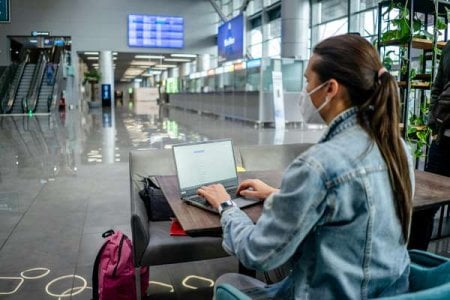Spot the unsuspecting airport scam duping travellers worldwide
By
Danielle F.
- Replies 1
In today's digital age, staying connected is more important than ever.
Several—if not all—travellers rely on free airport and paid in-flight Wi-Fi to keep in touch with loved ones, manage itineraries, or pass the time.
However, the convenience of free public Wi-Fi could have some hidden costs.
A 42-year-old man was charged with a cunning cybercrime targeting unsuspecting passengers and visitors.
He allegedly set up fraudulent Wi-Fi access points, mimicking the airport's official Wi-Fi networks in Perth, Melbourne, and Adelaide airports, as well as on domestic flights.
These 'evil twin' networks deceive users into connecting to them.
Once connected, users would be redirected to a bogus web page prompting them to log in with their email or social media accounts.
Their sensitive information would then be harvested by the scammer, giving them access to online accounts, stored media, and even bank details.
The scam came to light when vigilant airline employees noticed a suspicious Wi-Fi network during a flight.
Upon his arrival at Perth Airport last 19 April, Australian Federal Police (AFP) immediately seized the man's devices—which included a portable wireless access device, a laptop, and a mobile phone.
Police also raided his Palmyra home, which uncovered several personal data from victims.
A second raid occurred on 8 May, arresting the man and charging him with several offences.
AFP Western Command Cybercrime Detective Inspector Andrea Coleman issued a public warning about the dangers of public Wi-Fi networks.
'To connect to a free Wi-Fi network, you should not enter any personal details—such as logging in through an email or social media account,' she emphasised.
Here are some of the AFP’s tips to keep your data safe from 'evil' Wi-Fi networks:
Report any suspicious activity immediately to the Australian Cyber Security Centre's website.

Have you encountered similar scams during your travels? Share your experiences in the comments below to help other travellers stay safe.
Several—if not all—travellers rely on free airport and paid in-flight Wi-Fi to keep in touch with loved ones, manage itineraries, or pass the time.
However, the convenience of free public Wi-Fi could have some hidden costs.
A 42-year-old man was charged with a cunning cybercrime targeting unsuspecting passengers and visitors.
He allegedly set up fraudulent Wi-Fi access points, mimicking the airport's official Wi-Fi networks in Perth, Melbourne, and Adelaide airports, as well as on domestic flights.
These 'evil twin' networks deceive users into connecting to them.
Once connected, users would be redirected to a bogus web page prompting them to log in with their email or social media accounts.
Their sensitive information would then be harvested by the scammer, giving them access to online accounts, stored media, and even bank details.
The scam came to light when vigilant airline employees noticed a suspicious Wi-Fi network during a flight.
Upon his arrival at Perth Airport last 19 April, Australian Federal Police (AFP) immediately seized the man's devices—which included a portable wireless access device, a laptop, and a mobile phone.
Police also raided his Palmyra home, which uncovered several personal data from victims.
A second raid occurred on 8 May, arresting the man and charging him with several offences.
AFP Western Command Cybercrime Detective Inspector Andrea Coleman issued a public warning about the dangers of public Wi-Fi networks.
'To connect to a free Wi-Fi network, you should not enter any personal details—such as logging in through an email or social media account,' she emphasised.
Here are some of the AFP’s tips to keep your data safe from 'evil' Wi-Fi networks:
- Be sceptical of free Wi-Fi: Always verify the legitimacy of a Wi-Fi network with airport or airline staff. Avoid 'free' networks that ask for personal information to log in.
- Use a VPN: A Virtual Private Network (VPN) can encrypt your data, making it harder for scammers to intercept. Install a reputable VPN on your devices.
- Disable file sharing: When using public Wi-Fi, turn off file sharing functions like AirDrop to prevent unauthorised access to your files.
- Avoid sensitive transactions: Refrain from performing sensitive activities like online banking or shopping while connected to a public network.
- Forget the network: After using a public Wi-Fi network, change your device settings to 'forget' the network, preventing automatic reconnections.
- Turn off phone Wi-Fi: Disable your device's Wi-Fi when in public to avoid connecting to a risky network.
Report any suspicious activity immediately to the Australian Cyber Security Centre's website.
Key Takeaways
- A man was arrested after running an 'evil twin' Wi-Fi scam at various airports and flights to steal personal data.
- Unsuspecting users connected to the counterfeit Wi-Fi networks and entered their login details, compromising personal data.
- Police seized several of the man's devices after he arrived in Perth.
- Authorities reminded Wi-Fi users to take precautions to protect their data.








